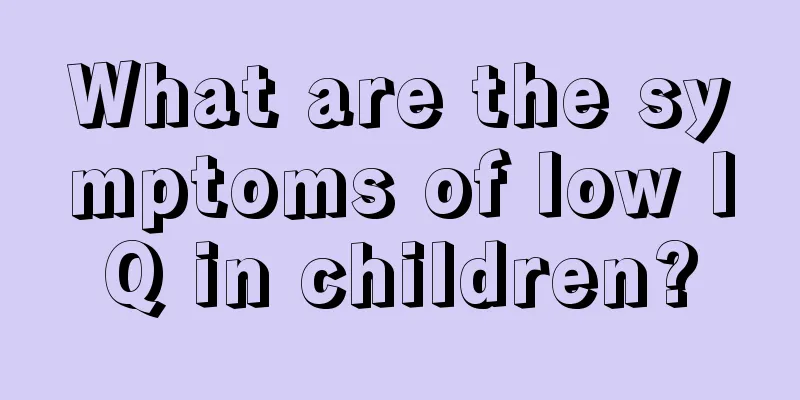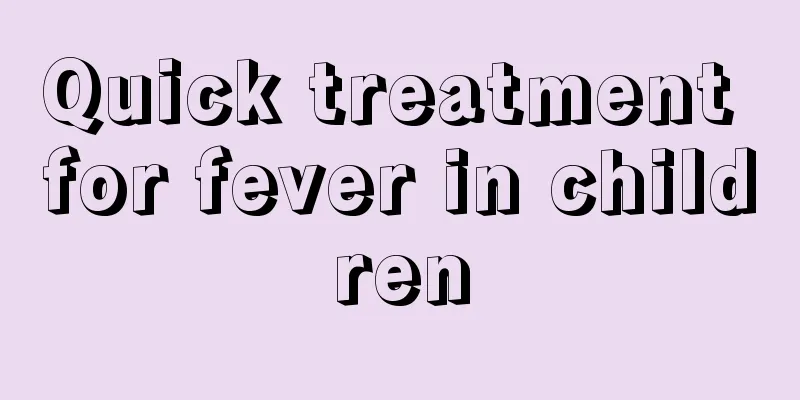What are the symptoms of low IQ in children?

|
Parents are proud of their naturally intelligent children, but some children’s IQs are not as good as expected. In fact, children with low IQ will show some signs from an early age. Children with normal intelligence will smile at 2 months old, while children with low intelligence will not smile until they are 1 year old. Inattention, drooling, clumsy movements, etc. These behaviors can show that the child's IQ is low. If parents find it early, the child can get timely treatment. The following is a brief introduction to the manifestations of children's low intelligence. 1. Not knowing how to laugh or only laughing very late. Normal babies will laugh at 2 months old and can laugh out loud at 4 months old. If a baby only smiles at 3 months old, rarely smiles at 6 months old, or cannot smile at 1 year old, it is a sign of mental retardation. 2. Incomplete development of eye function. Generally speaking, one-month-old babies will use their eyes to pay attention to the surrounding environment, while babies with mental retardation do not pay attention to people or things around them. 3. He reacts poorly to sounds and does not respond to the sounds made by adults nearby, seeming to be particularly "honest". The baby cries less often, sometimes only screams, or cries weakly. The baby is not likely to cry or is difficult to cry in response to external stimuli that could easily cause crying. 4. Chewing is slow, feeding is difficult, solid food is difficult to swallow and causes vomiting. Drooling is normal for children under one year old, but if drooling continues after one year old, it is a cause for concern. 5. Clumsy movements. Babies like to play with their hands. They will be able to do so at 3 to 5 months after birth, but it is abnormal if they still cannot play with their hands after 6 months or like to put toys in their mouths at 2 to 3 years old. The child's actions are childish, and even after he learns to walk, he still kicks his feet around. There are many aimless activities and adults are not clear about the children's intentions. 6. Lack of concentration, indifference to external things, or even if interested, it is very short-lived and the reaction is slow. Their abilities are relatively low, and their language ability, thinking ability, memory ability, calculation ability, and analytical and comparative ability are all worse than those of children of the same age. 1. Treatment of the cause For those whose causes have been identified, such as chronic disease, poisoning, long-term malnutrition, hearing or vision impairment, efforts should be made to eliminate the cause as much as possible so that their intelligence can be partially or completely restored. Children with endocrine and metabolic abnormalities such as hypothyroidism and phenylketonuria should be diagnosed early and receive thyroid hormone replacement or special diet therapy for phenylketonuria to improve their intelligence level. MR caused by social, psychological and cultural reasons can make its intelligence improve by changing the environmental conditions, allowing it to live in a friendly and harmonious family, and strengthening its education. 2. Training and rehabilitation Through the application of medical, social, educational and vocational training measures, patients are trained according to their age and severity of MR to achieve the highest possible intellectual level. Sooner or later, the child should receive long-term comprehensive education and training in organized institutions (such as nurseries and kindergartens). It is best to care for the sick child together with normal children, which is more beneficial than caring for them separately. Special classes or schools are set up to improve physical health, train daily living skills and language functions, and simple cultural learning. The establishment of work medical stations can, on the one hand, train production skills for adolescent patients and, on the other hand, guarantee employment. Special hospitals and sanatoriums (villages) can also be set up to admit patients with moderate or above MR. |
<<: What to do if your child has cavities in his teeth
>>: What to do if your child has scars from burns
Recommend
What's wrong with a girl's blood in her urine? Is it serious?
Some parents will find that their girls are actua...
What are the nutritional soups for children?
Nutritious soup is a favorite choice of many peop...
What are the symptoms of mercury poisoning in babies?
Babies are very active and curious about many thi...
What causes newborn babies to fart?
Newborns will fart uncontrollably after feeding. ...
What to do if your baby has repeated fever due to viral cold
My baby is still very young, and I dare not give ...
What should I do if my seven-month-old baby has a fever of 38.5?
Fever is a common condition in babies. The baby&#...
If your child has a stomachache, beware of these 7 dangerous diseases that parents should not ignore.
Many children have experienced stomachaches, and ...
Can the diphtheria-pertussis vaccine be delayed?
The diphtheria and pertussis vaccine is an intram...
What kind of fruit is good for children who don't like to eat?
Children sometimes have gastrointestinal discomfo...
What causes alopecia areata in children?
The healthy growth of children is very important....
If your baby farts a lot, moms should be careful because this is the reason!
Now many mothers have found that their babies far...
What to do if blisters grow on children's legs
If a child has blisters on his legs, parents will...
What should I do if my child’s nose is swollen?
Parents all know that as long as children are hea...
How to choose a children's pillow
How to choose a baby pillow? Many young parents a...
How to tie hair for little girls
Little girls love beauty very much, so they all w...









